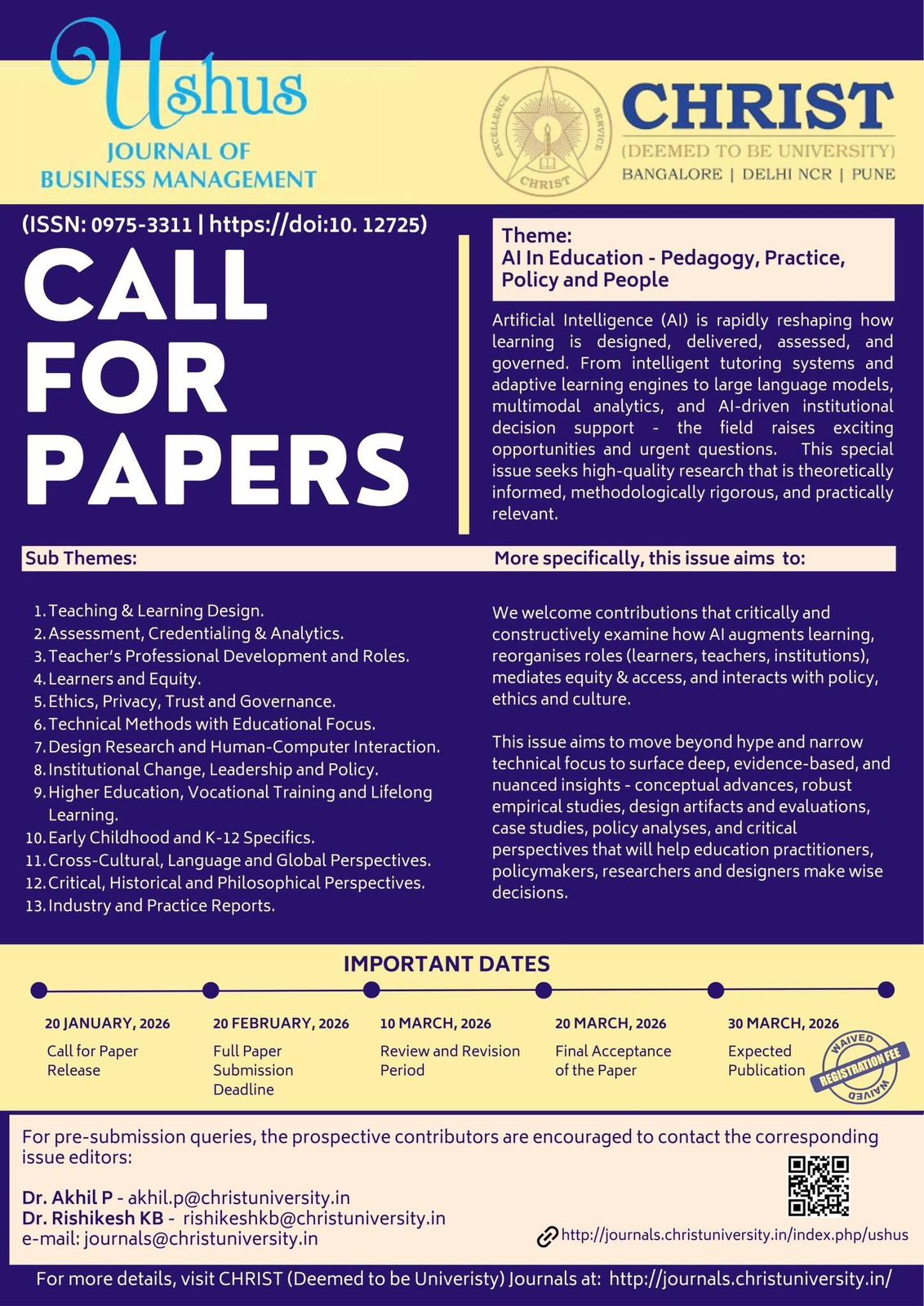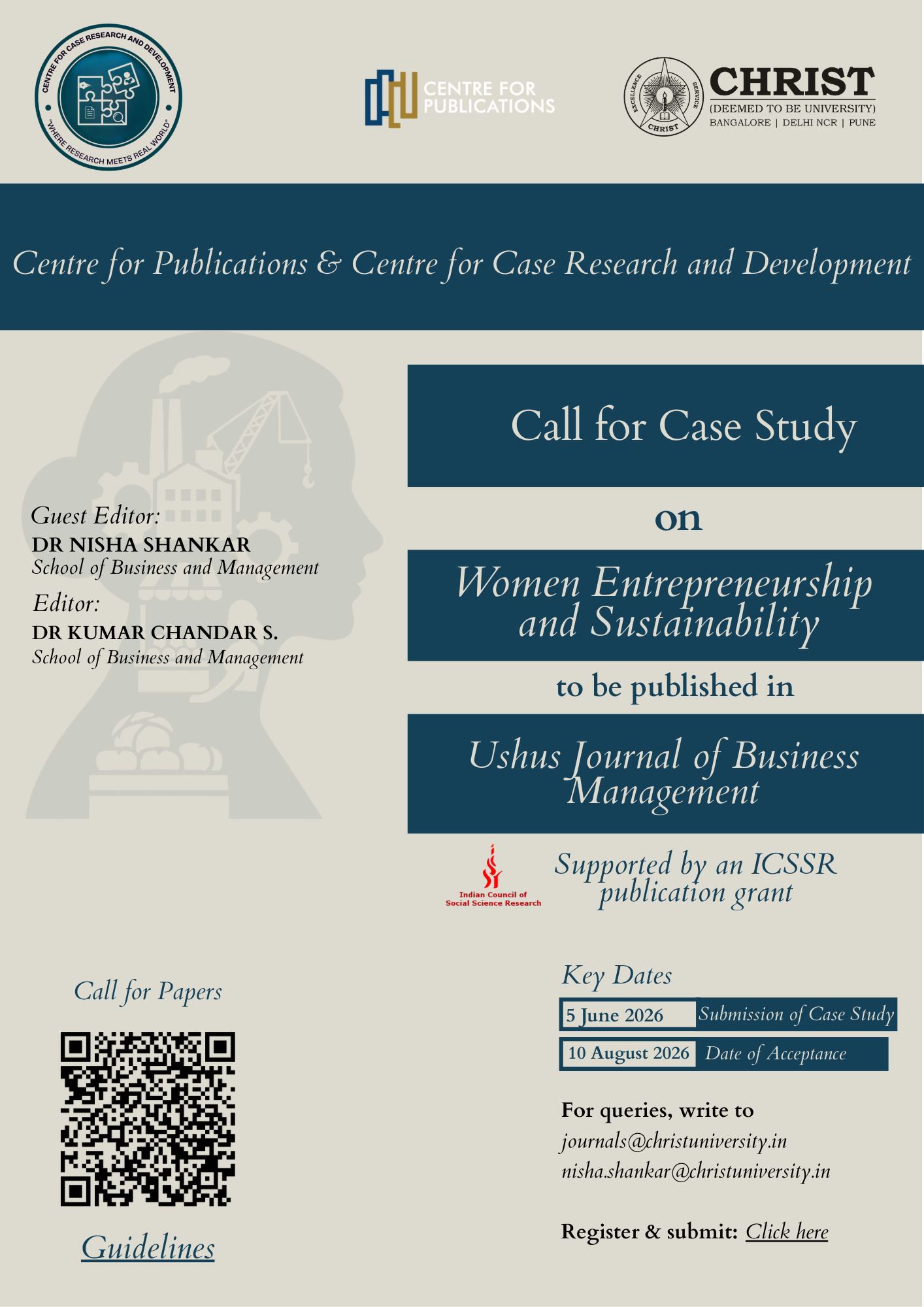Unpacking the Past and Charting the Future: A Comprehensive Review of Organizational Development Trends and Predictions
DOI:
https://doi.org/10.12725/ujbm.63.1Keywords:
Organisational Development, Trends, Transformation, TheoriesAbstract
The current study is a comprehensive review that provides an overview of recent trends in Organizational Development (OD) over the past five years (2018-23) based on empirical evidence. The study analyzes the identified trends, key concepts, and theories, and their impact on the OD field. The major trends in OD identified include strategic agility, learning and development, digital transformation, effective leadership, engagement and well-being, and fostering inclusivity and diversity. The study highlights the underlying theories and approaches that have influenced these trends. The findings suggest that organizations need to adapt to change faster with a dynamic environment and market expectations, and strategic agility is crucial for researchers and business practitioners. Learning and development within the organization is essential to keep employees up-to-date with relevant skills and help them adapt to changes much faster. Effective leadership, engagement and well-being, and fostering inclusivity and diversity are also critical for organizational growth and sustainability. The study provides insights for OD professionals to tailor solutions that meet the unique requirements of each organization and forecasts the future of OD globally by identifying trends and emerging issues.
References
Aghina, W., Handscomb, C., Salo, O., & Thaker, S. (2021). The impact of agility: How to shape your organization to compete | McKinsey. McKinsey & Co. https://www.mckinsey.com/capabilities/people-and-organizational-performance/our-insights/the-impact-of-agility-how-to-shape-your-organization-to-compete
Al Kahtani, N. S., & M. M., S. (2022). A Study on How Psychological Capital, Social Capital, Workplace Wellbeing, and Employee Engagement Relate to Task Performance. SAGE Open, 12(2), 21582440221095010. https://doi.org/10.1177/21582440221095010
Alderfer, C. P. (1977). Organization Development. Annual Review of Psychology, 28(1), 197–223. https://doi.org/10.1146/annurev.ps.28.020177.001213
Asatiani, A., Hämäläinen, J., Penttinen, E., & Rossi, M. (2021). Constructing continuity across the organisational culture boundary in a highly virtual work environment. Information Systems Journal, 31(1), 62–93. https://doi.org/10.1111/isj.12293
Avolio, B. J., & Walumbwa, F. O. (2014). Authentic leadership theory, research and practice: Steps taken and steps that remain. In The Oxford handbook of leadership and organizations (pp. 331–356). Oxford University Press. https://doi.org/10.1093/oxfordhb/9780199755615.001.0001
Bandura, A. (1977). Social learning theory (pp. viii, 247). Prentice-Hall.
Beier, M. E. (2022). Life-Span Learning and Development and Its Implications for Workplace Training. Current Directions in Psychological Science, 31(1), 56–61. https://doi.org/10.1177/09637214211003891
Beier, M. E. (2022). Life-Span Learning and Development and Its Implications for Workplace Training. Current Directions in Psychological Science, 31(1), 56–61. https://doi.org/10.1177/09637214211003891
Bouncken, R. B., Lapidus, A., & Qui, Y. (2022). Organizational sustainability identity: ‘New Work’ of home offices and coworking spaces as facilitators. Sustainable Technology and Entrepreneurship, 1(2), 100011. https://doi.org/10.1016/j.stae.2022.100011
Do, H., Budhwar, P., Shipton, H., Nguyen, H.-D., & Nguyen, B. (2022). Building organizational resilience, innovation through resource-based management initiatives, organizational learning and environmental dynamism. Journal of Business Research, 141, 808–821. https://doi.org/10.1016/j.jbusres.2021.11.090
Duchek, S. (2020). Organizational resilience: A capability-based conceptualization. Business Research, 13(1), 215–246. https://doi.org/10.1007/s40685-019-0085-7
Garro-Abarca, V., Palos-Sanchez, P., & Aguayo-Camacho, M. (2021). Virtual Teams in Times of Pandemic: Factors That Influence Performance. Frontiers in Psychology, 12. https://www.frontiersin.org/articles/10.3389/fpsyg.2021.624637
Hadian Nasab, A., & Afshari, L. (2019). Authentic leadership and employee performance: Mediating role of organizational commitment. Leadership & Organization Development Journal, 40(5), 548–560. https://doi.org/10.1108/LODJ-01-2019-0026
Hoang, T., Suh, J., & Sabharwal, M. (2022). Beyond a Numbers Game? Impact of Diversity and Inclusion on the Perception of Organizational Justice. Public Administration Review, 82(3), 537–555. https://doi.org/10.1111/puar.13463
Hofhuis, J., van der Rijt, P. G. A., & Vlug, M. (2016). Diversity climate enhances work outcomes through trust and openness in workgroup communication. SpringerPlus, 5(1), 714. https://doi.org/10.1186/s40064-016-2499-4
Li, L. (2022). Reskilling and Upskilling the Future-ready Workforce for Industry 4.0 and Beyond. Information Systems Frontiers. https://doi.org/10.1007/s10796-022-10308-y
Lokuge, S., Sedera, D., Grover, V., & Dongming, X. (2019). Organizational readiness for digital innovation: Development and empirical calibration of a construct. Information & Management, 56(3), 445–461. https://doi.org/10.1016/j.im.2018.09.001
Makarius, E. E., Mukherjee, D., Fox, J. D., & Fox, A. K. (2020). Rising with the machines: A sociotechnical framework for bringing artificial intelligence into the organization. Journal of Business Research, 120, 262–273. https://doi.org/10.1016/j.jbusres.2020.07.045
Manyika, J., & Sneader, K. (2018). AI, automation, and the future of work: Ten things to solve for (Tech4Good) | McKinsey. https://www.mckinsey.com/featured-insights/future-of-work/ai-automation-and-the-future-of-work-ten-things-to-solve-for
Naveed, R. T., Alhaidan, H., Halbusi, H. A., & Al-Swidi, A. K. (2022). Do organizations really evolve? The critical link between organizational culture and organizational innovation toward organizational effectiveness: Pivotal role of organizational resistance. Journal of Innovation & Knowledge, 7(2), 100178. https://doi.org/10.1016/j.jik.2022.100178
Porras, J. I., & Robertson, P. J. (1992). Organizational development: Theory, practice, and research. In Handbook of industrial and organizational psychology, Vol. 3, 2nd ed (pp. 719–822). Consulting Psychologists Press.
Saarikko, T., Westergren, U. H., & Blomquist, T. (2020). Digital transformation: Five recommendations for the digitally conscious firm. Business Horizons, 63(6), 825–839. https://doi.org/10.1016/j.bushor.2020.07.005
Salem, N. H., Ishaq, M. I., Yaqoob, S., Raza, A., & Zia, H. (2022). Employee engagement, innovative work behaviour, and employee wellbeing: Do workplace spirituality and individual spirituality matter? Business Ethics, the Environment & Responsibility, n/a(n/a). https://doi.org/10.1111/beer.12463
Song, X., Khosa, M., Ahmed, Z., Faqera, A. F. O., Nguyen, N. T., Rehman, S. U., & He, Y. (2022). Linking Transformational and Despotic Leadership to Employee Engagement: Unfolding the Role of Psychological Distress as a Mediator. Sustainability, 14(14), Article 14. https://doi.org/10.3390/su14148851
Tarba, S. Y., Frynas, J. G., Liu, Y., Wood, G., Sarala, R. M., & Fainshmidt, S. (2023). Strategic agility in international business. Journal of World Business, 58(2), 101411. https://doi.org/10.1016/j.jwb.2022.101411
Vallo Hult, H., & Byström, K. (2022). Challenges to learning and leading the digital workplace. Studies in Continuing Education, 44(3), 460–474. https://doi.org/10.1080/0158037X.2021.1879038
Walk, M. (2022). Leaders as change executors: The impact of leader attitudes to change and change-specific support on followers. European Management Journal. https://doi.org/10.1016/j.emj.2022.01.002
Wu, W., Chin, W., & Liu, Y. (2022). Technostress and the smart hospitality employee. Journal of Hospitality and Tourism Technology, 13(3), 404–426. https://doi.org/10.1108/JHTT-01-2021-0032
Youssef‐Morgan, C. M., & Luthans, F. (2015). Psychological capital and well‐being. Stress and Health: Journal of the International Society for the Investigation of Stress, 31, 180–188. https://doi.org/10.1002/smi.2623
Downloads
Published
How to Cite
Issue
Section
License
Copyright (c) 2023 Bishal Patangia, Vijaya R

This work is licensed under a Creative Commons Attribution-NonCommercial-NoDerivatives 4.0 International License.



